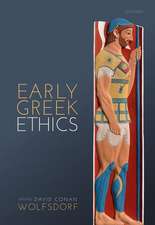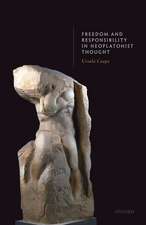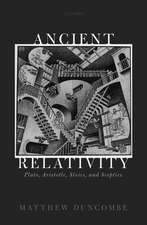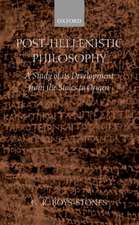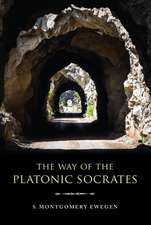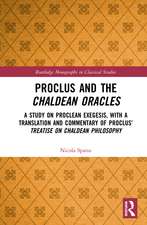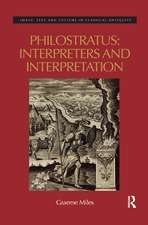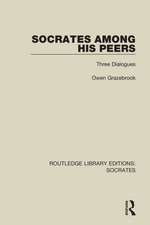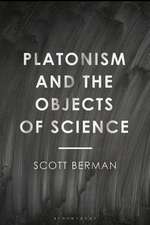Heraclitus: The Inception of Occidental Thinking and Logic: Heraclitus’s Doctrine of the Logos
Autor Martin Heidegger Traducere de Julia Goesser Assaiante, S. Montgomery Ewegenen Limba Engleză Paperback – 28 noi 2018
| Toate formatele și edițiile | Preț | Express |
|---|---|---|
| Paperback (1) | 124.44 lei 6-8 săpt. | +108.13 lei 5-11 zile |
| Bloomsbury Publishing – 28 noi 2018 | 124.44 lei 6-8 săpt. | +108.13 lei 5-11 zile |
| Hardback (1) | 442.03 lei 6-8 săpt. | |
| Bloomsbury Publishing – 28 noi 2018 | 442.03 lei 6-8 săpt. |
Preț: 124.44 lei
Preț vechi: 213.39 lei
-42% Nou
Puncte Express: 187
Preț estimativ în valută:
23.81€ • 24.77$ • 19.66£
23.81€ • 24.77$ • 19.66£
Carte tipărită la comandă
Livrare economică 14-28 aprilie
Livrare express 08-14 martie pentru 118.12 lei
Preluare comenzi: 021 569.72.76
Specificații
ISBN-13: 9780826462411
ISBN-10: 0826462413
Pagini: 328
Dimensiuni: 156 x 234 x 22 mm
Greutate: 0.5 kg
Ediția:New ed.
Editura: Bloomsbury Publishing
Colecția Bloomsbury Academic
Locul publicării:London, United Kingdom
ISBN-10: 0826462413
Pagini: 328
Dimensiuni: 156 x 234 x 22 mm
Greutate: 0.5 kg
Ediția:New ed.
Editura: Bloomsbury Publishing
Colecția Bloomsbury Academic
Locul publicării:London, United Kingdom
Caracteristici
A new translation of an important work by Martin Heidegger, now available in English for the first time
Notă biografică
Martin Heidegger (1889-1976) is regarded as one of the twentieth century's most important philosophers. S. Montgomery Ewegen is Assistant Professor of Philosophy and Classics at Trinity College, Hartford, USA. His research and teaching are focused on Ancient philosophy, 20th Century Continental philosophy, phenomenology, and their intersections.Julia Goesser Assaiante is a Visiting Assistant Professor of German in the Language and Culture Studies Department at Trinity College, Hartford, USA. Her research interests concentrate on eighteenth and early twentieth-century literature and philosophy, with an emphasis on poetic language, aesthetics, hermeneutics, and currents of anti-Enlightenment thought.
Cuprins
Translator's Foreword The Inception of Occidental Thinking: HeraclitusPreliminary concerns: Philosophy as the authentic thinking of the to-be-thought. On the inception of "Occidental" thinking Introduction: Preliminary Consideration of the Inceptual and the Word1. Two stories concerning Heraclitus as introduction to his word2. The word in the inception of thinkingMain Part: The Truth of Being Logic: Heraclitus's Doctrine of the LogosPrologueFirst Section: Logic: Its Name and Its MatterSecond Section: The Primordial and the Paths to AccessThird Section: Retreat into the Originary Region of Logic SupplementEditor's afterwordGerman to English GlossaryEnglish to German Glossary
Recenzii
An incredibly rich text, with much to offer to anyone interested in this early Greek philosopher or in Heidegger's pre-occupation with the Greeks.
The lecture courses about Heraclitus (summer 1943 and 1944) represent the real artistry of Heidegger's lecturing. This artistry consists of a unique intertwining of philosophical, political, and even poetical elements. Heidegger's interpretation of Heraclitus' fragments demonstrate an inspiring access to the beginning of Occidental thinking. The translators present a remarkable and thoughtful translation of Heidegger's intense German style. Reading Heidegger reading Heraclitus is a pleasure.
Heidegger's Heraclitus lecture courses from 1943 and 1944 focus respectively on the notions of physis (nature) and logos (logic). They give important insight into Heidegger's attempt to think these notions ever more inceptually in the context of his being-historical thinking, and thereby to find a way to reawaken a more originary sense of being. This thoughtful translation makes accessible for the English reader Heidegger's creative and central engagement with Heraclitus.
This long awaited translation was worth the wait. J. Goesser Assaiante and S. Montgomery Ewegen have provided us with a fluid and faithful translation of two of Heidegger's most sustained and important lecture courses on early Greek thinking. These manuscripts were written in 1943 and 1944, a pivotal time in Heidegger's development. They enable one to witness up close Heidegger's attempt to work out, by way of radically original translations and interpretations of Heraclitus's fragments, his understanding of the inception of the history of Occidental philosophy. At the same time, readers are invited to follow Heidegger in his attempt, by way of recovering and rethinking the deepest insights of Heraclitus and other early Greek thinkers, to think out beyond the end of the history of metaphysics that devolved from their greatness.
The translation of Heidegger's most sustained engagement with Heraclitus represents a significant contribution to Heidegger studies. These two lecture courses richly fill in Heidegger's engagement with early Greek thinking and include provocative - often politically revelatory - discussions of Nietzsche, technology, friendship and history. The translators have succeeded in capturing Heidegger's challenging wordplay in a manner that opens up the Greek original in new and unexpected ways while remaining accessible and lucid in English.
These two lecture courses on Heraclitus are Heidegger at his most provocative. More than a commentary, here Heidegger attempts to think through Heraclitus, with wonderfully startling results for our appreciation of each. The sustained attention to the pre-Socratic sense of both physis and logos is unmatched in his oeuvre. With this long awaited translation of a central volume in Heidegger's Gesamtausgabe, the translators have done the English reader a great service - not just the reader of Heidegger, but of Heraclitus as well.
These two lecture courses, devoted to what Heidegger called the "first [but incomplete] inception" of Western philosophy, provide his most extended treatment of Heraclitean physis and logos as accounting for how things emerge into meaningful presence. Scholars Assaiante and Ewegen are to be highly commended for their meticulous rendering of this important text into eminently readable English.
The lecture courses about Heraclitus (summer 1943 and 1944) represent the real artistry of Heidegger's lecturing. This artistry consists of a unique intertwining of philosophical, political, and even poetical elements. Heidegger's interpretation of Heraclitus' fragments demonstrate an inspiring access to the beginning of Occidental thinking. The translators present a remarkable and thoughtful translation of Heidegger's intense German style. Reading Heidegger reading Heraclitus is a pleasure.
Heidegger's Heraclitus lecture courses from 1943 and 1944 focus respectively on the notions of physis (nature) and logos (logic). They give important insight into Heidegger's attempt to think these notions ever more inceptually in the context of his being-historical thinking, and thereby to find a way to reawaken a more originary sense of being. This thoughtful translation makes accessible for the English reader Heidegger's creative and central engagement with Heraclitus.
This long awaited translation was worth the wait. J. Goesser Assaiante and S. Montgomery Ewegen have provided us with a fluid and faithful translation of two of Heidegger's most sustained and important lecture courses on early Greek thinking. These manuscripts were written in 1943 and 1944, a pivotal time in Heidegger's development. They enable one to witness up close Heidegger's attempt to work out, by way of radically original translations and interpretations of Heraclitus's fragments, his understanding of the inception of the history of Occidental philosophy. At the same time, readers are invited to follow Heidegger in his attempt, by way of recovering and rethinking the deepest insights of Heraclitus and other early Greek thinkers, to think out beyond the end of the history of metaphysics that devolved from their greatness.
The translation of Heidegger's most sustained engagement with Heraclitus represents a significant contribution to Heidegger studies. These two lecture courses richly fill in Heidegger's engagement with early Greek thinking and include provocative - often politically revelatory - discussions of Nietzsche, technology, friendship and history. The translators have succeeded in capturing Heidegger's challenging wordplay in a manner that opens up the Greek original in new and unexpected ways while remaining accessible and lucid in English.
These two lecture courses on Heraclitus are Heidegger at his most provocative. More than a commentary, here Heidegger attempts to think through Heraclitus, with wonderfully startling results for our appreciation of each. The sustained attention to the pre-Socratic sense of both physis and logos is unmatched in his oeuvre. With this long awaited translation of a central volume in Heidegger's Gesamtausgabe, the translators have done the English reader a great service - not just the reader of Heidegger, but of Heraclitus as well.
These two lecture courses, devoted to what Heidegger called the "first [but incomplete] inception" of Western philosophy, provide his most extended treatment of Heraclitean physis and logos as accounting for how things emerge into meaningful presence. Scholars Assaiante and Ewegen are to be highly commended for their meticulous rendering of this important text into eminently readable English.

